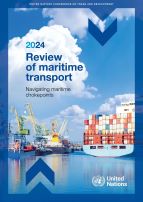The global economy, food security, and energy supply are increasingly threatened by vulnerabilities in major maritime routes.
The 2024 Maritime Transport Study reveals that critical maritime passages—such as the Panama Canal (connecting the Pacific and Atlantic Oceans), the Red Sea and Suez Canal (linking the Mediterranean Sea to the Indian Ocean via the Arabian Peninsula), and the Black Sea (a key hub for grain exports)—are under significant stress.
A combination of geopolitical factors, climate impacts, and conflicts has shaken global trade, jeopardizing the functioning of maritime supply chains.
An Uncertain Recovery Masking Deeper Challenges
Maritime trade, which increased by 2.4% in 2023 to reach 12,292 million tons, has begun to recover after a contraction in 2022. However, the future remains uncertain. The report forecasts modest growth of 2% for 2024, driven by demand for bulk commodities such as iron ore, coal, and grains, as well as containerized goods.
Yet, these figures mask deeper challenges. Containerized trade, which only grew by 0.3% in 2023, is expected to rebound by 3.5% in 2024, but long-term growth will depend on how the industry adapts to current disruptions, such as the war in Ukraine and rising geopolitical tensions in the Middle East.
Meanwhile, the supply of container ship capacity increased by 8.2% in 2023. Disruptions at major maritime chokepoints, which temporarily raised demand for vessels by lengthening shipping routes, have helped alleviate the issue of overcapacity.
However, if maritime routes return to normal, the imbalance between supply and demand could lead to an oversupply of container ships.
Key Recommendations
As the maritime industry faces increasing challenges, the report advocates for coordinated efforts to navigate, adapt, and thrive in this complex environment.
It recommends addressing the disruptions hindering maritime chokepoints, investing in low-emission and environmentally friendly shipping, enhancing port efficiency and adaptability, integrating trade facilitation to improve connectivity with hinterlands, and combating ship registration fraud.
Additionally, the report emphasizes the importance of monitoring freight market trends, assessing maritime transport rate trends, and their impact on vulnerable economies. By taking these measures, countries and their maritime industries can build a more resilient and sustainable future.
Source: unctad




